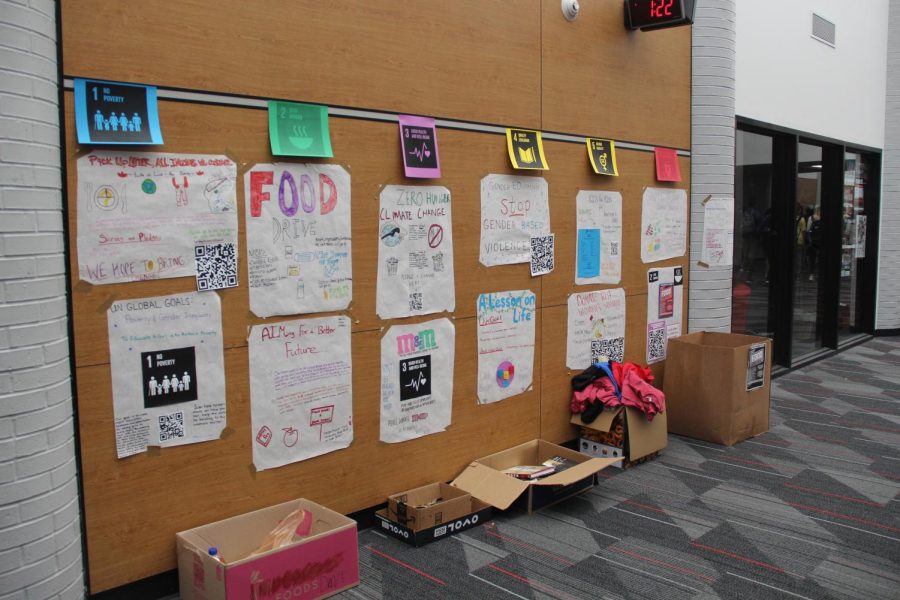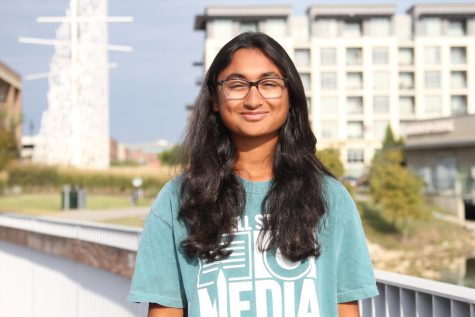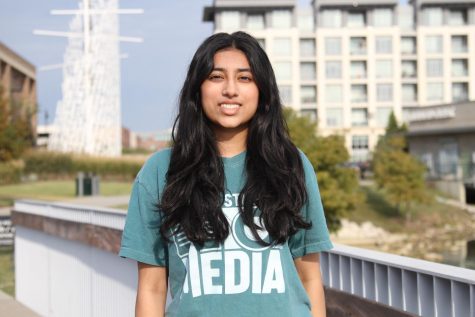Astronomy students chasing progress, educating on sustainability
March 11, 2022
Towards the end of the first semester, each year for the past decade, Coppell High School astronomy teacher Angela Barnes has presented her classes with a challenge.
First, she tells them to study the United Nations 17 Goals For A Sustainable Future and find one that speaks to them. Then, she prompts them towards the most important part: doing something about it.
“Sometimes, we’re stuck in this world where we just want convenience,” Barnes said. “We want what we want when we want it, and we don’t think about the consequences.”
This year’s students’ responses to the challenge will be implemented in a multitude of ways this month as they begin to send what they have learned in the classroom into the community. In the main hallway of CHS, collection boxes and posters have already been set up for contribution from the student body.
Beginning the year-long project in December, Barnes’ students selected one of the 17 UN goals and conducted in-depth research on the context of the goal and progress made towards its 2030 deadline.
While the semester came to a close, CHS winded down for the holidays. Astronomy students, however, were gearing up for the project’s next phase, planning social media campaigns and short documentaries to culminate their research.
CHS junior Alfred Fairchild and senior Lucas Mears, having taken an interest in the effects of methane gas from cow manure on CO2 emissions in the atmosphere, zeroed in on goal 11 (Sustainable Cities and Communities) and 15 (Life on Land). Their project plans to promote the Meatless Monday campaign at Starbucks, which is a part of the company’s goal to expand plant-based menu choices in order to to reduce carbon emissions by 50 percent by 2030.
Currently in their planning stage, Fairchild and Mears are looking for a Starbucks location to host a Monday night gathering and popularize the company’s initiative.
“Our project is finding a way to bring attention to the event,” Mears said. “Veganism gets a bad reputation sometimes, but we want people to know that they can participate in this, that this is an option and it’s not the taboo that people might think it is.”
Meanwhile, CHS seniors Hafsa Qazzafi and Kylie Fowler found their calling in goal 4 (Quality Education) and 15 (Life on Land). They transformed their inspiration into plans to write and illustrate a children’s book about local wildlife to be read aloud in schools and libraries around Dallas.
Sometimes, we’re stuck in this world where we just want convenience. We want what we want when we want it, and we don’t think about the consequences.
— Angela Barnes
“We’re targeting elementary schoolers for our book,” Fowler said. “It’s important for them to be educated on the environment around us, so we’re going to try to make it informative, but entertaining enough for a first or fourth grader to enjoy.”
Throughout the course of the project, Barnes makes sure to emphasize to her students that the actionability of their plans is the most important part.
“It’s also the hardest part, because they could research and they can tell me what the problems are, and that’s fine,” Barnes said. “But to do something about it – like, how do you make that change? Something like not going to buy their clothes from GAP anymore because they can just go and get them from the thrift store makes more of a difference than they realize, and I want them to know they have that power to make different choices.”
Sustainability, an unexpected but fitting part of Barnes’s astronomy class, is emphasized not only through the Sustainable Development Goals (SDG) challenge, but throughout the curriculum. Human pollution’s effect on astronomy and the forgotten astronomical discoveries of women are some of the topics covered in class that constitute the lens Barnes teaches through.
Her teaching style has not always been met with support. Under past administrations, Barnes remembers having to strongly advocate for her students’ ability to do the project, facing skepticism for her students studying a topic like gender studies while in an astronomy class.
“These are big issues that we just have to tackle,” Barnes said. “When I started doing this, the future seemed so far away, but it’s been a decade and these problems aren’t getting much better. We need some real initiative, and it’s going to come from the younger people because what I think is the most important goal is not necessarily what they think is the most important. So, I will continue doing the SDG project as long as I am able to.”
While Barnes has students receive permission from parents for their topics, she wants their projects to follow their passions. With the limitations of virtual learning last year, classes worked on localized projects and selected a goal as a class. This year’s students are working in small groups to choose their own line of research.
“I had a kid focusing on the trafficking of young boys, and nobody had ever brought that topic up to me before,” Barnes said. “It blew my mind. I was close to tears, and this kid was so passionate about this topic. I was not going to tell him he couldn’t focus on it because this is a science class.”
Though the UN Global Goals are supposed to be achieved by 2030, considerable progress––the amount of progress needed to slow, let alone reverse, the deteriorating situations of many of the goals––has not been made.
“I want them to come away from this project with a mindset like, ‘Not only did I learn from my project, but I learned from everyone else’s that there are little things I can do that will make a difference,’” Barnes said. “And it all starts there.”
Follow Saniya Koppikar (@SaniyaKoppikar) and @CHSCampusNews on Twitter.











